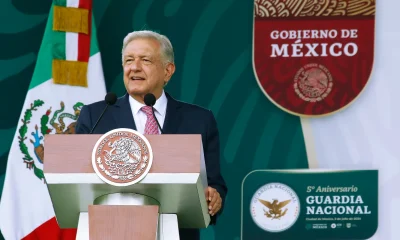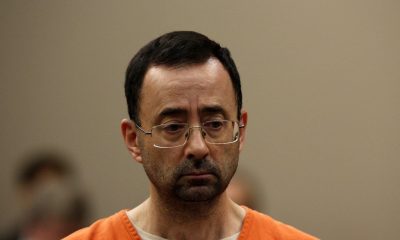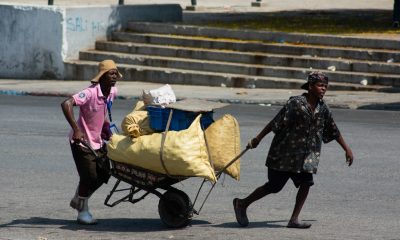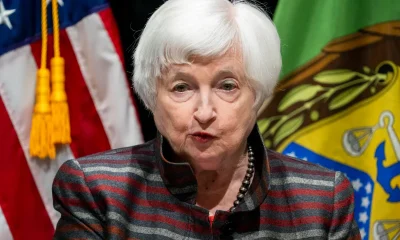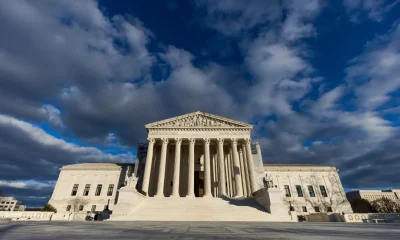International
The Supreme Court is inclined not to restrict the use of the abortion pill in the United States

The Supreme Court (TS) of the United States held a hearing on Tuesday on mifepristone, a substance used in abortion pills, and the judges mostly inclined not to restrict its use, in the most important abortion case that the highest court has had since it overthrewed the ‘Roe vs Wade’ ruling in 2022.
Despite the fact that the TS has a conservative majority and was the body that eliminated the constitutional protection of abortion almost two years ago, today it showed its reluctance to believe that the anti-abortion medical association Alliance for Hippocratic Medicine has shown that it suffered the type of damage that it entitles it to sue.
During the almost two hours that the oral arguments lasted, the Government and the pharmaceutical company GenBioPro emphasized their safety and thus rejected the arguments of Erin Hawley, a lawyer for the Alliance for Hippocratic Medicine, that the substance is dangerous.
A view rejected by multiple studies that have shown that the substance, used in most abortions in the United States, is safe.
The judges – whose decision will be known at the end of June or the beginning of July – are examining whether the regulatory changes carried out in 2016 and 2021 by the Food and Drug Administration (FDA) that made the drug available by mail and was prescribed by a health provider who does not have to be a doctor were legal.
Judge Samuel Alito, who was precisely the one who drafted the 2022 decision that annulled ‘Roe vs Wade’, was one of those who today showed his dissatisfaction with the Joe Biden administration’s argument that doctors do not have the legal right or “legitimacity” to sue.
“Is there anyone who can sue and obtain a court ruling about whether what the FDA did was legal? Maybe what they did was perfectly legal. But shouldn’t someone be able to challenge that in the courts?” the conservative asked.
But there were more who expressed doubts. The also conservative Neil M. Gorsuch described this case as “an excellent example of how to convert what could be a small demand into a legislative assembly” into a case “at the national level about the approval of the FDA.”
It has been almost two years since the Supreme Court eliminated the ‘Roe vs Wade’ doctrine that had protected abortion nationally for decades. Since then, two dozen states have restricted or banned abortion and that is why ‘teleabortion’ has been the solution for millions of women in the country.
A judicial decision restricting mifepristone would affect service providers in all states, including those where abortion is still legal. It would also make the aforementioned procedure difficult, by which women receive abortion pills by mail and are treated by doctors electronically.
And it could call into question the ability of the FDA to approve and distribute other medicines.
This case began in November 2022, after a group of doctors and anti-abortion medical organizations sued the FDA.
The coalition filed the challenge in Amarillo (Texas) and Judge Matthew J. Kacsmaryk, appointed by Trump and openly opposed to abortion, issued a preliminary ruling invalidating the approval of the drug and withdrawing the pill from the market.
In August 2023, three judges of the Court of Appeals of the Fifth Circuit of the United States, one of the most conservative appeals courts in the country, determined that mifepristone should remain legal, but imposed important access restrictions, which are now in the air, pending the decision of the Supreme Court.
Mifepristone is one of the two medications used in a drug abortion and is combined with misoprostol to terminate a pregnancy.
It blocks progesterone, a hormone necessary for the pregnancy to continue, while misoprostol causes uterine contractions, which causes the body to expel the fetus.
Numerous studies indicate that the combination of these pills causes a complete abortion in more than 99% of patients.
The Planned Parenthood organization recalled on Tuesday in a statement that mifepristone is “safe and effective, with or without a visit to a health center” and that it has been used by more than five million people in the United States for more than 23 years.
In the opinion of Alexis McGill Johnson, president and general director of the organization, this case is a sign that “those who oppose abortion remain committed” to controlling women’s bodies “prohibiting abortion throughout the country.”
International
U.S. Senate Rejects Budget, Bringing Government Closer to Shutdown Amid DHS Dispute

The U.S. Senate voted on Thursday against a budget proposal in a move aimed at pressuring changes at the Department of Homeland Security (DHS), following the killing of two civilians during a deployment of immigration agents in Minneapolis.
All Senate Democrats and seven Republican lawmakers voted against the bill, which requires 60 votes to advance, pushing the country closer to a partial government shutdown that would cut funding for several agencies, including the Pentagon and the Department of Health.
The rejection came as Senate leaders and the White House continue negotiations on a separate funding package for DHS that would allow reforms to the agency. Proposed measures include banning Immigration and Customs Enforcement (ICE) agents from wearing face coverings and requiring them to use body-worn cameras during operations.
The vote took place just hours after President Donald Trump said he was “close” to reaching an agreement with Democrats and did not believe the federal government would face another shutdown, following last year’s record stoppage.
“I don’t think the Democrats want a shutdown either, so we’ll work in a bipartisan way to avoid it. Hopefully, there will be no government shutdown. We’re working on that right now,” Trump said during a Cabinet meeting at the White House.
International
Trump Says Putin Agreed to One-Week Halt in Attacks on Ukraine Amid Extreme Cold

U.S. President Donald Trump said on Thursday that he secured a commitment from Russian President Vladimir Putinto halt attacks against Ukraine for one week, citing extreme weather conditions affecting the region.
“Because of the extreme cold (…) I personally asked Putin not to attack Kyiv or other cities and towns for a week. And he agreed. He was very pleasant,” Trump said during a Cabinet meeting broadcast by the White House.
Trump acknowledged that several advisers had questioned the decision to make the call.
“A lot of people told me not to waste the call because they wouldn’t agree. And he accepted. And we’re very happy they did, because they don’t need missiles hitting their towns and cities,” the president said.
According to Trump, Ukrainian authorities reacted with surprise to the announcement but welcomed the possibility of a temporary ceasefire.
“It’s extraordinarily cold, record cold (…) They say they’ve never experienced cold like this,” he added.
Ukrainian President Volodymyr Zelensky later commented on the announcement, expressing hope that the agreement would be honored.
International
Storm Kristin Kills Five in Portugal, Leaves Nearly 500,000 Without Power

Storm Kristin, which battered Portugal with heavy rain and strong winds early Wednesday, has left at least five people dead, while nearly half a million residents remained without electricity as of Thursday, according to updated figures from authorities.
The revised death toll was confirmed to AFP by a spokesperson for the National Emergency and Civil Protection Authority (ANPEC). On Wednesday, the agency had reported four fatalities.
Meanwhile, E-Redes, the country’s electricity distribution network operator, said that around 450,000 customers were still without power, particularly in central Portugal.
Emergency services responded to approximately 1,500 incidents between midnight and 8:00 a.m. local time on Wednesday, as the storm caused widespread disruptions.
The Portuguese government described Kristin as an “extreme weather event” that inflicted significant damage across several regions of the country. At the height of the storm, as many as 850,000 households and institutions lost electricity during the early hours of Wednesday.
Several municipalities ordered the closure of schools, many of which remained shut on Thursday due to ongoing adverse conditions.
Ricardo Costa, regional deputy commander of the Leiria Fire Brigade, said residents continue to seek assistance as rainfall persists.
“Even though the rain is not extremely intense, it is causing extensive damage to homes,” he noted.
In Figueira da Foz, a coastal city in central Portugal, strong winds toppled a giant Ferris wheel, underscoring the severity of the storm.
-

 Central America5 days ago
Central America5 days agoGuatemala seizes over a ton of cocaine hidden in flour at Pacific port
-

 Central America4 days ago
Central America4 days agoGuatemala Police Arrest Prison Guard Caught in the Act of Extortion
-

 Central America4 days ago
Central America4 days agoHonduras swears in conservative president Asfura after disputed election
-

 International5 days ago
International5 days agoHistoric snowstorm paralyzes Toronto after 60 centimeters of snow
-

 Central America4 days ago
Central America4 days agoBukele leads public trust rankings as UCA survey highlights gains in security
-

 International2 days ago
International2 days agoFootball Fan Killed in Clashes After Colombian League Match
-

 International5 days ago
International5 days agoSpain’s irregular migrant population rises to 840,000, study finds
-

 Central America2 days ago
Central America2 days agoGuatemala President Says Starlink Terminal Found Inside Prison
-

 International4 days ago
International4 days agoDoomsday clock moves to 85 seconds before midnight amid rising global risks
-

 International4 days ago
International4 days agoWinter Storm Fern Leaves 30 Dead and Over One Million Without Power Across the U.S.
-

 International1 day ago
International1 day agoU.S. Senate Rejects Budget, Bringing Government Closer to Shutdown Amid DHS Dispute
-

 Sin categoría4 days ago
Sin categoría4 days agoEight Killed in Series of Armed Attacks in Ecuador’s Manabí Province
-

 International4 days ago
International4 days agoSpain approves plan to regularize up to 500,000 migrants in Historic Shift
-

 International5 days ago
International5 days agoRights group says nearly 6,000 killed in Iran protest crackdown
-

 International2 days ago
International2 days agoRubio Says U.S. Could Participate in Follow-Up Russia-Ukraine Talks
-

 International2 days ago
International2 days agoMissing Spanish Sailor Rescued After 11 Days Adrift in Mediterranean
-

 Sin categoría4 days ago
Sin categoría4 days agoEl Salvador Launches Fourth Year of Ocean Mission to Protect Marine Ecosystems
-

 Central America10 hours ago
Central America10 hours agoPanama Supreme Court Strikes Down Panama Ports Concession as Unconstitutional
-

 International5 days ago
International5 days agoVenezuela frees at least 80 political prisoners, NGO says
-

 International5 days ago
International5 days agoEU launches new probe into X over AI-generated fake nude images
-

 International1 day ago
International1 day agoStorm Kristin Kills Five in Portugal, Leaves Nearly 500,000 Without Power
-

 Central America10 hours ago
Central America10 hours agoU.S. and Guatemala Sign Trade Deal Granting Zero Tariffs to Most Exports
-

 International1 day ago
International1 day agoTrump Says Putin Agreed to One-Week Halt in Attacks on Ukraine Amid Extreme Cold
-

 International1 day ago
International1 day agoMan Arrested After Vehicle Crashes Into Jewish Institution in Brooklyn
-

 International5 days ago
International5 days agoFrance debates ban on social media for children under 15
-

 International5 days ago
International5 days agoSevere winter storm grips U.S., leaves multiple dead as extreme cold persists

























